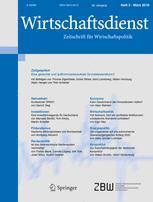Europe in a new world order
The EU is a relatively open economy and has benefited from the multilateral system. We argue that the EU should defend its strategic interests. The Si
This research has been published on Wirtschaftsdienst Zeitschrift für Wirtschaftspolitik 98th Year, 2018, Issue 13

A version of this publication has been published previously by Bruegel as a Policy Contribution
The United States is the most important partner of the EU in trade and bilateral investment and has, up to now, supported a multilateral trade system. It has supported European integration and has provided a security guarantee to the countries of the EU. But its relative importance has fallen, as has that of other advanced economies. The US administration appears to be on a course aiming at replacing multilateralism with bilateral deals. In trade, it aims to secure new trade deals in order to reduce bilateral trade deficits and to protect in particular the domestic manufacturing sector. In climate policy, commitments to the Paris agreement are questioned. In defence, the security umbrella appears less certain than previously. The overall promise that seems to stand behind this change of direction is to put "America first" and deliver better results for US citizens.
Policy challenge
The EU is a relatively open economy and has benefited from the multilateral system. We argue that the EU should respond to the US changing from its previous course with a three-pronged strategy to defend its interests. First, it should collaborate with partners around the world in defence of the World Trade Organisation (WTO). Second, it should establish deeper economic relations with emerging economies, including China, who support the rules-based multilateral system. As far as China is concerned, the EU should continue its negotiations toward a bilateral investment treaty while insisting on reciprocity and the use of public courts for dispute settlement. Collaboration in support of the Paris agreement is also essential. Third, the EU must be reformed to increase its external credibility. This concerns trade governance and addressing internal imbalances. Moreover, strengthening Europe's social model would provide a counter-model to protectionist temptations.



